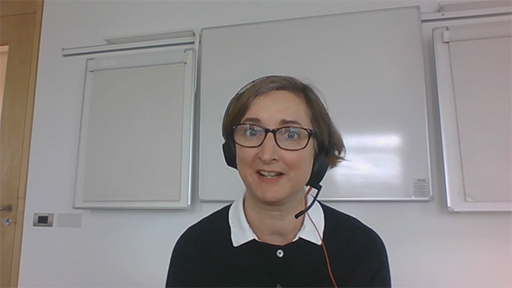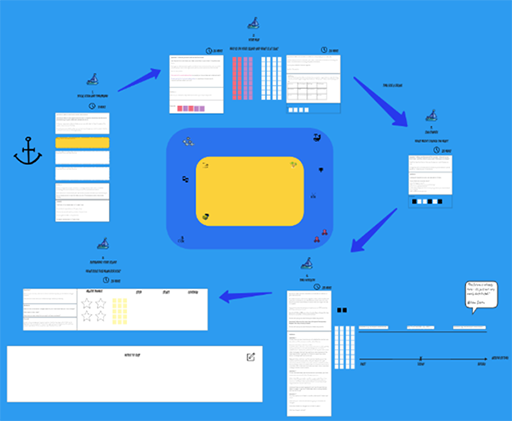5.5 Islands in the Sky – a case study
In the following case study Anne Gambles (Senior Project Manager, The Open University) explains the work they did with Dr Matt Finch and Murray Cook, Brendan Fitzgerald and Zindzi Cresswell (Strategy and Scenario Practitioners) and the team from AZB Selva, consulting to use Islands in the Sky for exploring new ways of working within The Open University’s Learner and Discovery Services (LDS) unit.
The case study provides an outline of the approach, integrated with videos in which Anne and Murray share their experience of the process.
Case study: Islands in the Sky with LDS, The Open University
Developing the approach
During the COVID-19 pandemic in 2020, we identified a need to find new ways of working that would be fit for the future. We used pulse surveys to gather colleagues’ views on how they would like to work in the future and run ‘What’s our Why?’ sessions. To complement these activities, we decided to look for an innovative approach to help structure our thoughts and conversations about the future, while working in uncertain times.
Dr Matt Finch was engaged in 2021, to introduce a future thinking methodology to help people think and talk about the future in a meaningful way. Phase 1 workshops were run with project teams and strategic leaders to test the Islands in the Sky method. These demonstrated an awareness and appetite to connect with innovative and practical responses to construct robust and authentically equitable futures. These outcomes helped to inform the design of test and learn experiments for hybrid working and physical workspace design with the Open University.
In 2022, we engaged AZB Selva (Murray Cook, Zindzi Cresswell and Brendan Fitzgerald) to work with us on Phase 2, to further develop the Islands in the Sky methodology and plan for the future.
Phase 2 focused on creating and embedding a toolkit for individuals and teams to have conversations about the future.
The main aims were to:
- Encourage a creative and imaginative approach for foresight and futures planning.
- Foster resilience and encourage engagement with the near future.
- Build confidence and capability for managing uncertain futures.
The process
Over a period of five weeks during the COVID-19 pandemic, we ran remote-only workshops for colleagues from across the Open University. The learning from these sessions was used to develop the Islands in the Sky toolkit in Miro, an online collaborative whiteboard, and guidance presented in a PDF.
We asked participants to begin by deciding on their focal issue and time horizon. The focal issue is something that they wish to explore or to make a decision about. They then start mapping their transactional environment and identify the internal and external entities they interact with as they carry out their work, and the type of relationship they have with them – either functional or social.
Participants then considered the uncertainties which shape, or drive decisions made by the entities they interact with. Then they focused on factors or forces that can’t be fully predicted in advance, and that might radically change their way of working in time to come.
Different combinations of these factors were then chosen by participants to explore and sketch different scenarios, and how they may impact relationships and working environments of the future. Participants thought about what the factors might look like in relation to their chosen time horizon.
Participants were then asked to consider the critical issues they identified, the context they were operating in and the impact of these on their focal issue. They were then asked if the focal issue has changed at all? What should they stop, start or continue now, that may help them act if/when change happens – what needs to be in place?
Lastly, time was allocated to review the experience, and agree what actions they might take away. The outputs from the workshops where then summarised and collated into reports to feedback to the project sponsor and arrange ongoing conversations with workshop participants.
In the video Anne and Murray reflect on the experience of running the workshops.

Transcript: Video 18 Experience of using Islands in the Sky
Outcomes
The initial benefits from using Islands in the Sky are the diverse voices, experience and opportunities that we have collated from the workshops. These have been used by the Directorate and senior leadership group to inform unit planning and draw on the evidence to consider risk management, business continuity planning and strategic directions.
The Islands in the Sky toolkit can now be used by teams according to their planning/business cycle and can be used alongside our ‘What’s our Why?’ toolkit. In order to do this and embed the learning further, we are developing further resources. This includes a programme to develop an in-depth understanding of the methodology for change champions, to enable others to lead workshops for organisation-wide strategic programmes across The Open University.
Reflection and learning
In the video Anne and Murray share their reflections on the benefits and opportunities of using this method.

Transcript: Video 19 Benefits and opportunities
An important point that underpins the Island in the Sky method is that you cannot look at the future once. Futures work requires you to come back again and again, as, not only does the world change, but people’s views and information they can share changes. It is thought that by embedding this methodology into our strategic planning cycles it can become a very powerful tool to continually consider what we need to start or stop doing.
In order to develop the approach further, we gathered feedback from the workshop participants, and found the key themes that emerged where:
- They enjoyed how collaborative the workshops can be.
- They valued hearing the views of colleagues from other areas of the university as this helped them to piece together a puzzle that had been difficult to make sense of.
- It created a safe space to talk about and exchange shared experiences of the uncertainties they were facing as individuals within the workplace, but also how they felt about the organisational uncertainties.
- More positive outcomes could be achieved by adapting the workshops to reflect the participants, and focusing workshops for different groups, for example:
- senior leaders only
- mix job role
- mixed unit groups
- focusing on those involved in strategic priorities, like developing our understanding of inclusion, by offering a safe space for specific groups to be open about how they feel we as an organisation can be more inclusive and diverse.
The feedback and reflecting on our experience of developing Phase 2 has been invaluable for shaping the development of this approach. By having different conversations within The Open University about our opportunities, uncertainties, our future, and how we can support the wider purpose of the organisation, can help to develop a shared understanding.
Activity 19 Thinking about collaborating with others
An important element of Islands in the Sky is collaborating with others and bringing different voices into the conversations to create a shared understanding. In the case study, a key consideration was raised from the review of the process – that they may not have had the right people involved.
Think about problems/issues and who you need to have ‘in the room’ to ensure that you gain the right insights to help move forward. Reflect on the notes you took while watching the videos from Matt, Anne and Murray.
Consider how using the Islands in the Sky approach might lead to better conversations for the future and help identify the areas you need to focus on when approaching futures planning.
You may wish to make notes in the box below.

